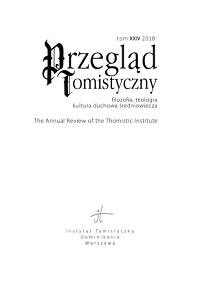Language as Representation of the Reality in Cracow Grammatical Texts from the 15th Century. The Modist Inheritance
Language as Representation of the Reality in Cracow Grammatical Texts from the 15th Century. The Modist Inheritance
Author(s): Krystyna Krauze-BłachowiczSubject(s): History of Philosophy, Philosophy of Language
Published by: Instytut Tomistyczny
Keywords: modi significandi; John of Glogovia; Cracow University; representation; fictions; non-beings
Summary/Abstract: “Propter hoc enim datus est nobis sermo, ut praesto nobis faciunt mutuae voluntatis indicia”: this quotation from Calcidus’ translation of Plato’s Timaeus was a motto of the 13t century Modist grammarians in their attempts to specify the scientific goal of grammar as a discipline responsible for the transmission of concepts and emotions from one human subject to another. In the modistically inspired grammar of John of Glogovia, presented in the end of the 15th century at the University of Cracow, this reference to Plato is followed by a comment: “Sermo significativus est aggregatum ex pluribus vocis, per quod unus potest alteri exprimere mentis conceptum.” In agreement with the Modist tradition, this specific linguistic relation between people is possible thanks to the modes of signification, which are ultimately grounded in reality through the mediation of modes of understanding. Language categories are secondary to the real modes of being of things and modes of understanding common to all people make it possible for them to achieve mutual understanding. In the 15th century, in grammatical texts taught in Cracow, and above all in of John of Glogovia’s handbooks, one can see how later medieval philosophy of language tried to find a suitable form of semantic adequacy binding particular language categories with things to which they referred to with the help of various forms of tradition of both positive and Modist grammar. Substantives, the non-evident gender of nouns and the not fully specified language function of interjections are just a few examples of the categories whose understanding often depends on the explanation of the way in which a human soul operates on the discovery of seemingly non-evident modes of the being of things that are subjects of linguistic description.
Journal: Przegląd Tomistyczny
- Issue Year: 2018
- Issue No: XXIV
- Page Range: 611-625
- Page Count: 15
- Language: English

